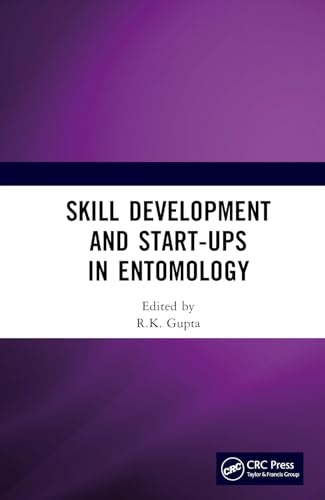
Skill Development and Start-Ups in Entomology
R.K. Gupta
Questions & Answers
The book presents diverse entrepreneurial avenues in entomology, catering to the needs of educated but unemployed entomologists. It covers sectors like agricultural, medical, and forensic entomology, insect tourism, and photography. It also discusses insect farming, bioagents, and green pesticides, and the role of taxonomists and museum curators. The book emphasizes skill development and start-ups, helping entomologists explore ventures like consulting, pest control services, and retail businesses. It also highlights the importance of technology and innovation in the field, providing a comprehensive guide for career advancement and entrepreneurship. By offering multidirectional pathways based on skills, enthusiasm, and assets, the book empowers entomologists to create their own opportunities and contribute to economic growth.
The book emphasizes the importance of skill development in entomology by highlighting the vast career opportunities beyond traditional roles like agricultural pest control. It suggests that entomologists can become entrepreneurs by leveraging their expertise in various ventures. Key skill sets required include:
- Technical Expertise: Deep understanding of entomology, including insect biology, behavior, and ecology.
- Research Skills: Ability to conduct research, analyze data, and develop new methods or technologies.
- Communication: Effective written and verbal communication for consulting, teaching, and public engagement.
- Problem-Solving: Ability to identify and solve complex problems in pest management and related fields.
- Entrepreneurial Skills: Business acumen, marketing, and networking for starting and growing ventures.
The book outlines various entrepreneurial avenues, such as insect farming, consulting, forensic entomology, and educational programs, each requiring a unique blend of these skills.
The challenges and barriers faced by entrepreneurs in the entomology sector include lack of handling and expertise in insects, insufficient awareness about insects and their conservation, lack of funding and extension programs, and inadequate collaboration at national and international levels. The book proposes to mitigate these constraints by offering a comprehensive guide to various entrepreneurial avenues in entomology, including insect farming, biopesticides, and insect tourism. It emphasizes the importance of skill development, networking, and leveraging government initiatives like 'Startup India' to overcome financial and operational hurdles. Additionally, the book highlights the role of technology, such as drones and web development, in creating innovative solutions and expanding market reach.
The book integrates technological entrepreneurship into the entomology sector by exploring various avenues such as web development, bioengineering, and product development. It emphasizes the role of technology in enhancing entomological research, pest management, and product creation. By highlighting the importance of technology-based entrepreneurship, the book encourages the development of innovative solutions for pest control, insect farming, and other entomological applications.
The potential impacts on social and economic development are significant:
- Job Creation: Technological entrepreneurship in entomology can lead to the creation of new jobs, especially in research, development, and implementation of innovative solutions.
- Economic Growth: By developing new products and services, the sector can contribute to the country's GDP and economic growth.
- Sustainable Practices: The integration of technology can promote sustainable pest management and insect farming practices, reducing reliance on harmful chemicals and minimizing environmental impact.
- Education and Awareness: Technological entrepreneurship can raise public awareness about the importance of entomology and its applications, fostering a more informed society.
- Global Competitiveness: By developing cutting-edge technologies and products, the entomology sector can become more competitive on the global stage.
The book "Skill Development and Start-Ups in Entomology" offers several key takeaways for students and professionals:
-
Diverse Career Paths: The book highlights various career paths in entomology, including agricultural, medical, forensic, and commercial sectors, providing a broader perspective beyond traditional agricultural pest control.
-
Entrepreneurship Opportunities: It emphasizes the potential for entrepreneurship in entomology, such as insect farming, biopesticides, and educational services, offering new avenues for income generation.
-
Skill Development: The book underscores the importance of skill development, including communication, analytical, and technical skills, to excel in the field.
-
Networking and Resources: It encourages networking with professionals and joining organizations like the Entomological Society of India for support and opportunities.
-
Business Planning: The book provides guidance on creating business plans, including market analysis, financial planning, and marketing strategies, which is crucial for starting a successful venture.
Applying these insights, students and professionals can:
- Explore Career Options: Research and identify the career path that aligns with their interests and skills.
- Develop Skills: Acquire relevant skills through education, training, and practical experience.
- Start Businesses: Leverage the book's entrepreneurship insights to create a business plan and launch a venture.
- Network: Connect with peers and professionals to expand opportunities and gain insights.